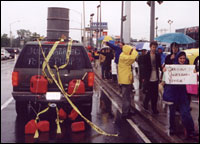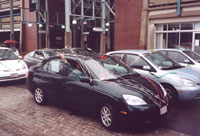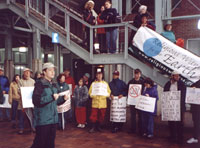There are more scenic places for a demonstration — the Lincoln Memorial, say, or the lawn of the Capitol. But the Lynnway, an endless stretch of dreary light industry and heavy commerce just north of Boston, was perfect for our purposes. Not because of the greyhound racing track, not because of the discount furniture outlets. Because of the auto dealers, crowded with shiny SUVs.

Just married … to the pump.
Photo: Alan Wagner.
Every city in North America has a few of these automiles, where one lot butts up against the next, all crowded with this year’s models. These lots are where Americans make the most environmentally significant decisions of their lives (except, perhaps, for how many kids to have). And that’s why a hundred of us were there this past Saturday morning, in the pouring rain — to remind our neighbors that these private decisions have a public dimension. That in this case, how they spent their money was not absolutely their own business. That “Hey hey, ho ho, SUVs have got to go.”
The demonstration, endorsed by a dozen local groups and organized by Debra Hall and Marci Gerulis of the Coalition for Environmentally Responsible Economies, was the first of its kind in the nation, an attempt to take anti-SUV bumper-sticker and ticket campaigns to a new level. It also marked a new level of religious involvement in the cause — at least four ministers from various denominations were on hand, including Bob Massie, an Episcopal priest who also heads CERES, Fred Small, director of Religious Witness for the Earth, and Dan Smith, a Congregational minister who won the prize for the day’s best poster: “What Would Jesus Drive?”

They didn’t let the rain stop their parade.
Photo: Alan Wagner.
The morning began with a few speeches and songs, before participants, led by a parade of seven hybrid Toyotas and Hondas, began walking a soggy picket line in front of the auto dealers. A rented SUV, whose back window read “Just Married — to the Gas Pump” dragged a dozen gas cans along the pavement behind it.
Passing motorists honked, car shoppers gawked — and dealership employees looked on with interest. At least one dealer, forewarned by demonstration organizers, had moved his big SUVs to the back of the lot and arranged his small models along the street — and a hybrid Toyota Prius in the place of honor by the road.
Interest in the demonstration went beyond the dealers. Both GM and Ford conducted conference calls with local dealers in the days leading up to the demonstration, which received large-scale coverage in the Boston Globe, the Lynn paper, the Christian Science Monitor, the Palm Beach Post, and other papers.

Hey hey, ho ho, SUVs have got to go.
Photo: Alan Wagner.
Ford also dispatched boxes of its “Corporate Citizenship Report” to dealers, which set up one of the day’s more memorable moments. Massie, whose advice has been sought by Ford in recent years, went into a dealership to talk with the owner, and was handed one of the reports — which included an essay Massie had authored and his own picture, featured prominently.
Organizers said they hoped the demonstrations would continue in the Boston area, albeit on sunnier days, and that they would spread the campaign to other locales. Not everyone can get to the Lincoln Memorial — but, like it or not, every American is within striking distance of an SUV dealer.

